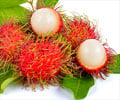According to a study, UK ‘s 119 million pound campaign to boost fruit and vegetable intake among young children could have been in vain after all.
According to a study, UK ‘s 119 million pound campaign to boost fruit and vegetable intake among young children could have been in vain after all.
Professor Janet Cade and colleagues of Leeds University assessed the impact of the School Fruit and Vegetable Scheme (SFVS), installed in 2004, on 3,700 young students from 98 schools in the north of England. A specially devised measure for children was used to assess dietary and nutrient intake.It was seen that though the scheme initially boosted intake by half a portion and slightly increased levels of beta carotene and vitamin, these increases waned seven months later and had disappeared by year three - when pupils aged seven to eight were no longer eligible for the scheme. Fruit and vegetable intake fell at home, possibly because parents thought that their children were getting their quota at school.
The program was aimed at increasing fruit and vegetable consumption and cutting the risk of heart disease and cancer in later life by improving children's diets. Apples, pears, bananas, satsumas, carrots and cherry tomatoes were the fruits on offer, along with extra varieties, depending on the time of year.
The researchers, who published their findings in Journal of Epidemiology and Community Health, opine that the range of fruit and vegetables on offer is narrow, because of health and safety concerns over the time needed for preparation. For long-term impact, they suggest that the scheme needs to be more structured and targeted, with involvement from the whole school as well as peers and parents. They said the fruit and vegetable message also needs to be carried forward at all meal times and throughout a child's education.
Says Cade: "To provide an effective intervention to increase young children's consumption of fruit requires measures not only to initiate a change of fruit intake but also to sustain changes that occur in the short term. "The findings of this evaluation showed a short-term increase in fruit intake can be achieved in young children who remain in the scheme - however, further interventions may be needed to prevent the waning of this effect."
Source-Medindia
ANN/M










